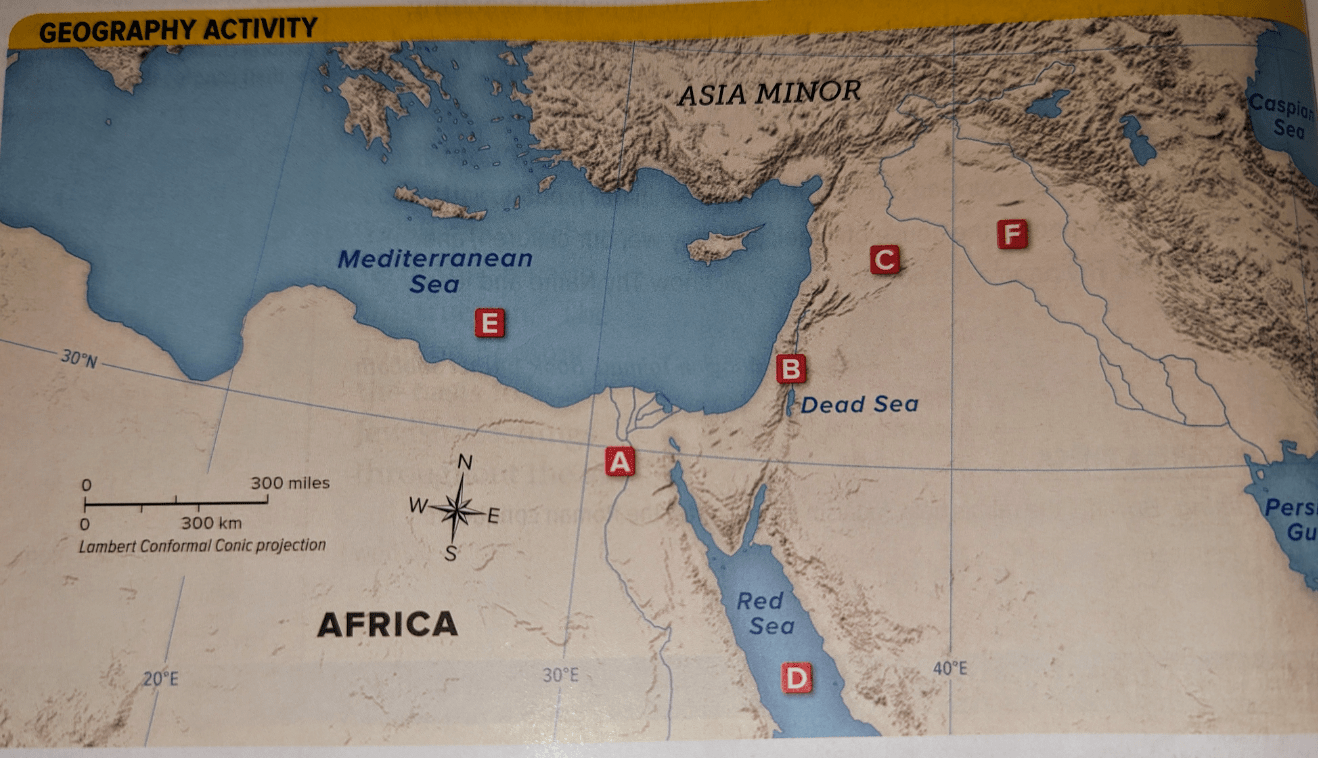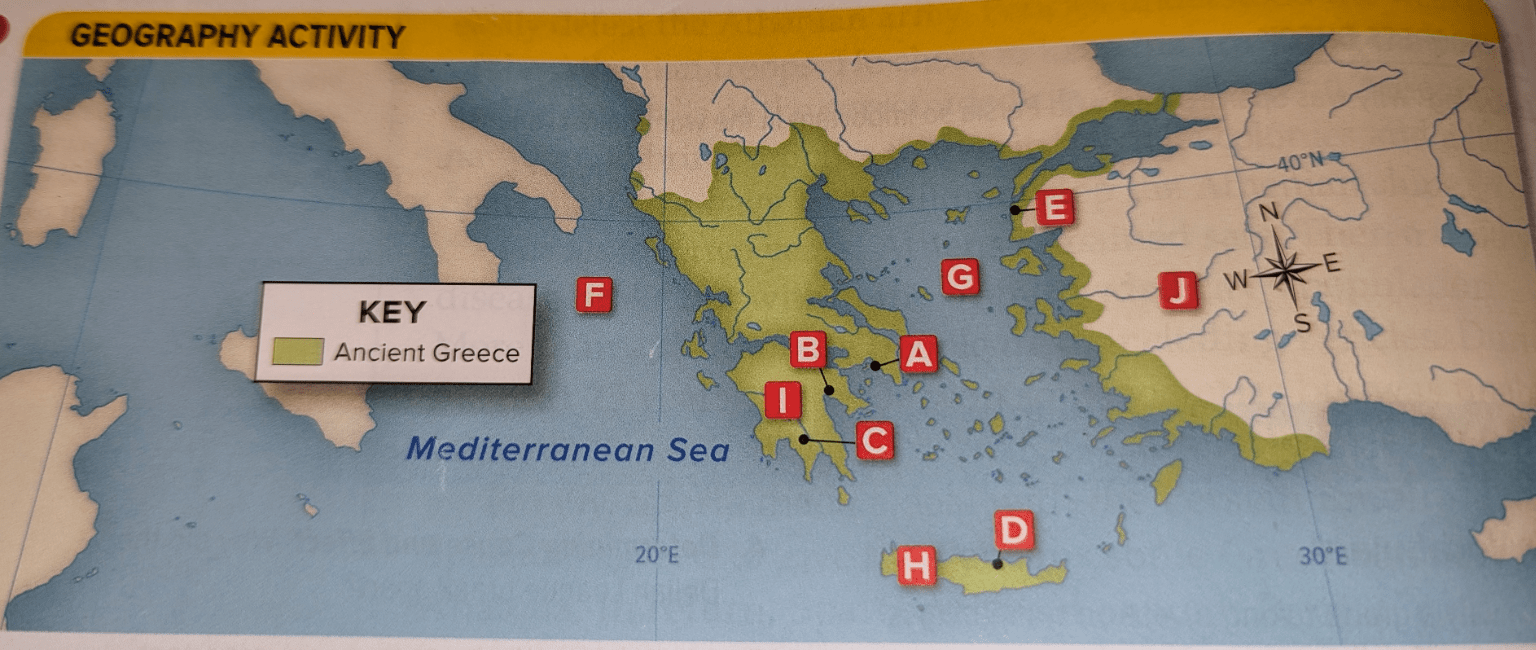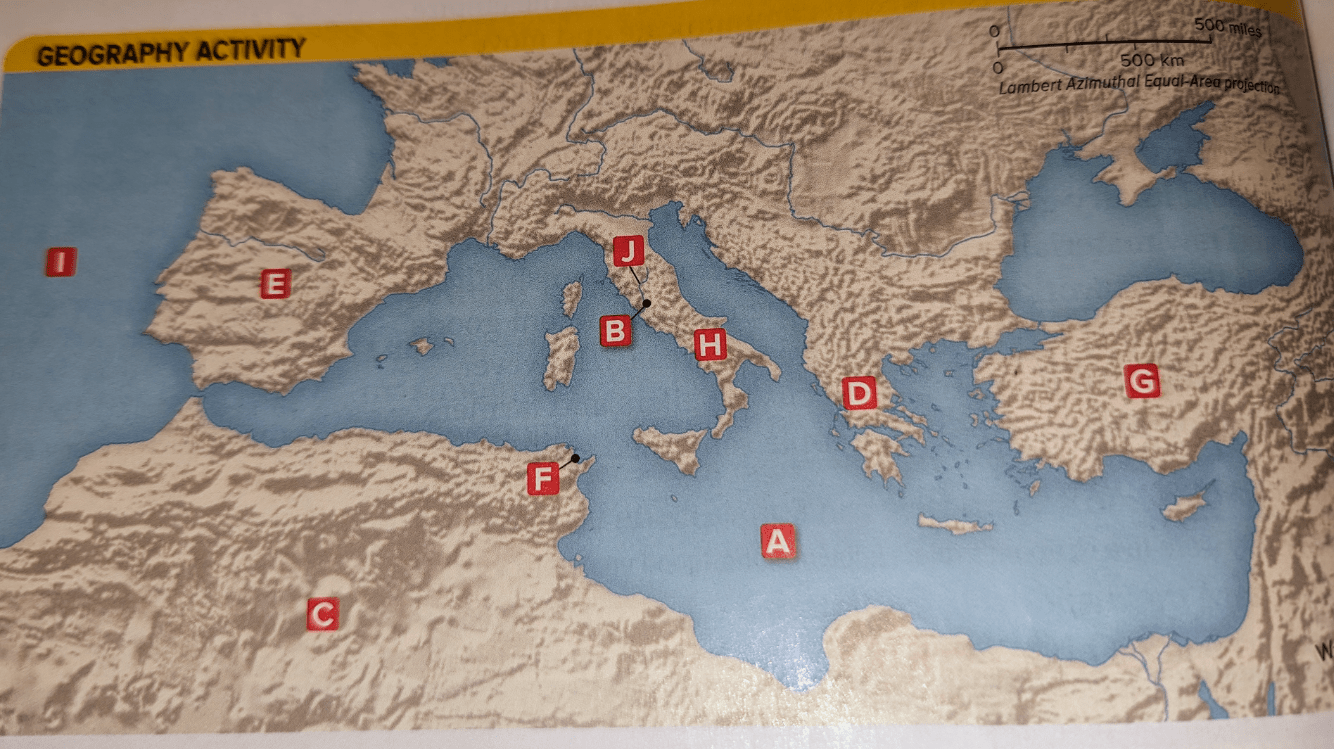Rules that God wanted the Israelites to follow.
commandments
Abraham and his family migrated from _______ to _______.
Mesopotamia to Canaan.
The first civilization to arise in ancient Greece.
The Minoan civilization.
The name of the last Etruscan king who was overthrown by the Romans in 509 B.C.
Tarquin the Proud.
Label: A, B, C, D, E, F

A- Egypt
B- Israel
C- Canaan
D- Red Sea
E- Mediterranean Sea
F- Mesopotamia
Name of the holy festival celebrated by the Jews in remembrance of their freedom from slavery in Egypt.
Passover
1. Name of the person who received the name "Israel" from God.
2. The departure of the Israelites from slavery in Egypt is called the ____.
1. Jacob.
2. Exodus.
Identify two scientific theories for the collapse of the Minoan civilization.
1. The civilization was destroyed by tsunamis caused by underwater earthquakes.
2. The civilization was destroyed by the mainland civilization of Mycenae.
Name the three groups that settled in Italy around 1000 B.C.
Latins, Greeks, and Etruscans.
Label: A, B, C, D, H

A- Athens
B- Mycenae
C- Sparta
D- Knossos
H- Crete
1. Food that is prepared according to Jewish dietary law.
2. A period in Ancient Greece where trading and farming failed, and many people stopped reading and writing.
1. Kosher.
2. The Dark Age.
Skilled sailors and talented traders who contributed their alphabet to many other civilizations, and occupied the land of Canaan.
The Phoenicians.
Three differences between Athens and Sparta.
1. Spartans were descendants of the Dorians, whereas Athenians descended from Mycenaeans.
2. Young boys of Sparta were educated in combat and warfare, whereas Athenian boys studied different subjects at school, and after finishing at 18, were expected to take part in public affairs.
3. Spartan women were independent and were trained in sports, and had to keep physically fit. They participated in business, could own property, and travel. On the other hand, Athenian girls were educated in domestic duties by their mothers and taught how to be good wives and mothers. They could not participate in business and government or own property.
4. Sparta's government was an oligarchy, whereas Athens' government was a republic/democracy.
1. Adopted around 451 B.C., Rome's first code of law was called the _______.
2. The members of the Second Roman Triumvirate.
1. The Twelve Tables.
2. Octavian, Mark Antony, and Marcus Lepidus.
Label: A, B, C, F, H, J

A- Mediterranean
B- Rome
C- Africa
F-Carthage
H- Italy
J- Tiber River
1. This word means "love of wisdom."
2. A form of government where citizens elect their leader.
3. The ruling class in Rome.
4. Ordinary citizens in Rome.
1. Philosophy.
2. A republic.
3. Patricians.
4. Plebeians.
1. King ______ was honored by the Israelites as their greatest king after his death.
2. List of the three parts of the Hebrew Bible.
1. David.
2. The Torah, The Prophets, and The Writings.
1. Names of two Greek historians.
2. The Age of Pericles was also known as the ______.
3. This Greek poet wrote several epic poems about heroic deeds, including the Iliad.
4. This philosopher taught that the universe was governed by the same laws as music and numbers.
1. Thucydides and Herodotus.
2. Golden Age of Athens.
3. Homer.
4. Pythagoras.
1. Rome fought this country in the Punic Wars.
2. The Punic Wars helped Rome develop as a republic...
1. Carthage
2. because they gained new territories in North Africa, Spain, and the Mediterranean.
1. The idea that citizens have a responsibility to help their country.
2. Large farming estates in Rome owned by wealthy nobles.
3. Meaning, "Roman Peace."
4. Three rulers that share equal political power.
5. The Roman marketplace where people went to socialize, trade, and listen to debates.
1. Civic duty.
2. Latifundia.
3. Pax Romana.
4. Triumvirate.
5. The forum.
1. This civilization conquered the Israelites around 722 B.C.
2. The Persian king who let the Jews return to Judah.
1. The Assyrians.
2. Cyrus II.
1. He was known as “the father of medicine.
2. This philosopher was sentenced to death for his teaching.
3. Greeks who trained and were skilled in the art of winning arguments were called _____.
1. Hippocrates.
2. Socrates.
3. Sophists.